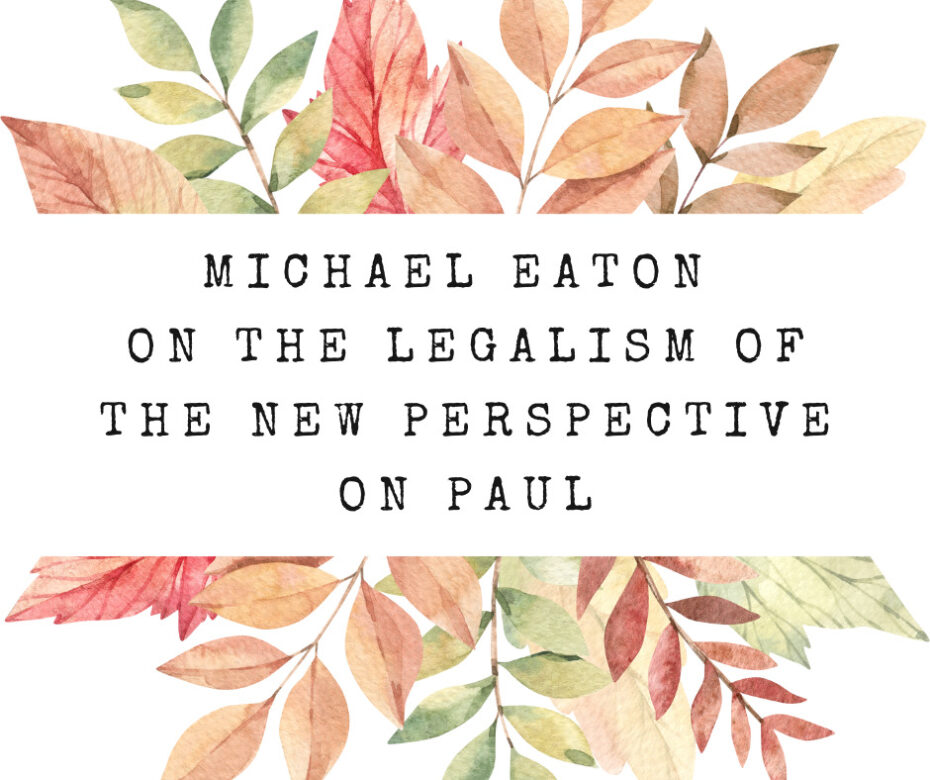Seminary students and pastors will have heard of the “New Perspective on Paul” (or “covenantal nomism”) championed by scholars such as N. T. Wright, James D. G. Dunn, and E. P. Sanders, and reflected (I think) in popular movements such as the “Federal Vision.”
The critical issue with the New Perspective is that it promotes works salvation. But don’t take my word for it. Here is Michael Eaton’s evaluation.
He begins by summarizing the New Perspective’s interpretation of Paul (as taught by N. T. Wright). They interpret Paul as objecting to being “justified” according to the ceremonial law, such as having to do with what days to celebrate and what foods to eat:
What then is Wright’s teaching? It is this. The ‘works of the law’ in Romans and Galatians have nothing to do with general good living (‘moral good deeds’). Rather they are certain aspects of the Mosaic law (circumcision, holy days, food laws, especially) which kept God’s people divided and hindered the ‘healing of creation’ which has been God’s purpose ever since the days of Abraham. A division between Jews and gentiles made some sense before the time of Jesus, but it makes no sense now. We have died to the law (circumcision, holy days, food laws) and now can be ‘declared to be God’s covenant-people’ (justification is really nothing more than this) by our faith in the faithfulness of Jesus the fulfiller of Israel’s history (see here).
Is this the same kind of justification as has been taught since the Reformation? Nope:
Wright says that some might say of his view of justification and the Reformation view “It sounds pretty much the same to me” but he insists his teaching is different from the Reformation view of the matter. It is indeed! It turns out to be in one respect a movement back to the enemy of Luther, Cardinal Eck, the Catholic prelate, who taught that the ‘works of the law’ are only circumcision, holy days, food laws, and the like! Indeed this is what most expositors have to say if they wish to avoid Paul’s teaching of justification by faith without any kind of salvation-obtaining obedience to any part of the Mosaic law. To make ‘works of the law’ refer to a few ceremonies and rituals is the way to make such a move away from a justification-by-faith-only doctrine (see here).
As I often say, there are many different ways of making salvation depend upon works. Just because you deny one kind of works-salvation does not mean you do not strongly endorse another. For example, the New Perspective makes works necessary for staying saved, and Eaton rightfully notes that is legalistic, too:
The idea in some circles is that first-century Judaism was not legalistic in the way that Paul describes it in Romans. Jews thought they were saved by God’s entering into covenant with them (so the idea goes). The law is not a way of ‘getting in’ to God’s people. It is only a way of ‘staying in.’
However, such an approach is still legalism. Paul attacked ‘staying in’ by law as much as if not more than he attacked ‘getting in’ by law. When Paul asked, ‘Are you now being made perfect by the flesh?’ it was ‘staying in’ by keeping the law that he had in mind (Eaton, Return to Glory, pp. x-xi).
As Eaton summarizes:
I am afraid ‘covenantal nomism,’ as it is called, is itself legalistic, and the scholars who want to defend it are themselves closer to the men of Acts 15:1 than they are to Paul.


